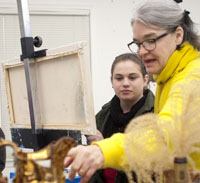Why I Give: Q&A With Elizabeth Ann Grimm Ph.D. ’71

Majoring in chemistry at Randolph was one of the best decisions of her life, shared Elizabeth "Liz" Ann Grimm.
Liz: I knew that Randolph-Macon Woman’s College had wonderful arts, and I had considered pursuing a major in music (which ended up as my minor). However, during my first year, I was drawn to the excitement and promise of science and by a most engaging set of faculty, who ended up providing me with a world-class scientific college educational experience. We had access to the latest instrumentation for our classes and were encouraged to perform independent research projects, which at first seemed very difficult, but quickly changed to being exciting opportunities for discovery. This excitement has turned into a passion for discovery in the field of cancer research, and has stayed with me all my life.
After college, when she started a Ph.D. program at UCLA School of Medicine, Liz says she was better prepared than any of her classmates.
Liz: I attribute this to the unique aspects of Randolph, including the personal attention due to the small class sizes, the requirement of proper English writing in all science reports and mostly due to the quality of the education, as the faculty took time to explain details and engaged directly with students, resulting in knowledge and confidence required for a professional school.”
Liz also appreciated the residential experience, where she gained self-confidence and was required to take a variety of subjects, with notable enjoyable courses such as comparative religion and art history.
Liz: Those have become most useful as well as I travel and meet with scientists from around the world. Randolph did make sure the students had opportunities to achieve and provided a rich environment for all. The advances in science, particularly in cancer and human medical science, are occurring at a pace faster than ever before, and I certainly hope that our current and future Randolph scientists continue access to such opportunities.
You can plan a legacy that creates opportunities for future generations of students and instills a lifelong love of learning like it did for Liz. To learn more about making a gift that supports your passion at the College, contact The Planned Giving Office at 434-485-8050 or plannedgiving@randolphcollege.edu.

